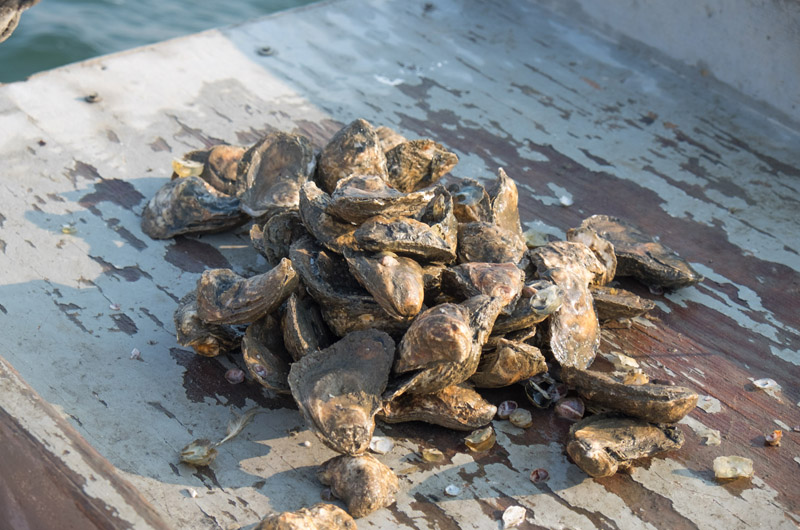Katama Bay oyster farms reopened for business Thursday morning after a two-week closure because of Vibrio illness traced to oysters harvested from the water.
Edgartown shellfish constable Paul Bagnall said the 12 aquaculture farms operating on Katama Bay were back up and running early Thursday, with Katama oysters coming out of the water for the first time in two weeks.
On August 26, the state Departments of Public Health and Marine Fisheries announced a one-week precautionary closure because of confirmed cases of Vibrio parahaemolyticus illness linked to consuming raw oysters from the bay. Last week the closure was extended another seven days when three more illnesses were confirmed.
This is the third year in a row for Vibrio-related closures in Katama Bay as aquaculture industries around the country deal with increased reports of illnesses. The naturally-occurring bacteria is more abundant in warmer waters.
Mr. Bagnall said since last week, there have been two more confirmed cases of Vibrio tied to the area, but the cases date back to early August.
“If it behaves like it did last year, it tends to tail off in September even though the water temperatures stay warm,” Mr. Bagnall said. A state Vibrio control plan, with established protocols for harvesting and handling meant to reduce cases of illnesses, remains in effect through October.
Scientists said last week that several illnesses reported from Katama Bay oysters were shown to be from a particularly virulent strain of Vibrio that is now found in East Coast waters. The strain has come to the area from the West Coast.

While the oyster farms remained on hold last week, scientists have been busy studying Katama Bay conditions and various oyster handling techniques in an effort to learn more about Vibrio, how to identify when the bacteria is present in the oysters, and how to reduce cases of illness. State officials are also working to balance public health and economic concerns.
Last week, some oyster farmers said they were being unfairly penalized, and other parts of the production chain should be looked at more closely. Chris Schillaci, the state Vibrio control coordinator, said last week that he was certain that the illnesses did not stem from improper handling by oyster farmers, who by all accounts are following more stringent Vibrio control measures. He also emphasized that other parts of the chain are investigated and have not been found to be at fault either.
Edgartown health agent Matt Poole echoed that sentiment, and refuted rumors he said he’s heard that the restaurants are at fault. “Everyone is sort of . . . curious if it’s a problem establishment, is this a restaurant problem or is this something different,” Mr. Poole said Thursday. “It’s very clear that this is something different than a restaurant problem to those of us that have dealt with the investigation at the food service establishment level.”
Mr. Poole said he has accompanied a state inspector on two investigations into illnesses, called trace-backs, at Edgartown restaurants. The investigations include a review of restaurant records, interviews with staff to measure their knowledge and ability, and observing and evaluating the restaurant’s food safety program.
“They couldn’t have been more thorough,” he said, calling the results very good to excellent.
Restaurants are invested in the success of the local aquaculture industry, Mr. Poole said. “Part of their marketing to the public is the fact that they’re offering local product, fresh, high quality local product.”
Mr. Poole said so far there have been “trace-backs” to two Edgartown establishments, three Oak Bluffs venues, and one each in Vineyard Haven and Menemsha. “So it’s not a single town, not a single establishment, and the findings have been that the way that the establishment was handling its oysters did not contribute to the illness.”
Mr. Poole said wholesalers have also not been found at fault.
“The possibility exists that everyone could do everything properly across the board and we could, capital C could, see some illness,” he said. “And that would be attributed to other causes, just things that people can’t control.”
The health agent emphasized that people eating oysters at home should be sure to keep the oysters properly chilled before eating them, especially if they plan to eat them raw. Cooking oysters kills the bacteria.
As state officials and locals continue to look into how to address the issue, about which there are still more questions than answers, Mr. Bagnall said he thought closures might be over for this year.
“I’m hopeful that we’ve seen the last of it,” Mr. Bagnall said. “But I’m an optimist.”







Comments (1)
Comments
Comment policy »